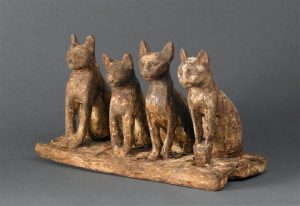As the Olympic Games of 2016 come to an end, one may ponder the origins of such an influential event. It was in 776 B.C.E. when the first Olympic game made its appearance in history. The location is quite interesting on its own, since it was in Olympia, Greece. Olympia is where Greeks would come and honor the gods, and they held several festivals in their honor. The name of the city and game comes from the nearby mountain named Olympos, which was not only the highest mountain in Greece, but it was also once home to the greatest Greek gods and goddesses, according to Greek mythology. The motive for starting such a competition was because Greeks had a deep appreciation for the human body and competition. According to the Greek philosopher Socrates, it is a “disgrace for a man to grow old without ever seeing the beauty and strength in which his body is capable.”1 In addition, the competition provided a platform for establishing a sense of collective identity among the different city-states that competed. Officials and competitors flocked to the events in Olympia, which included foot races, long jumps, boxing, wrestling, and many others. Unlike today’s Games, winners then did not receive gold medals. Instead, olive leave wreaths were given to the winners of the events, and the admiration of their city-states was another plus.2
The games were held every summer, every four years, in Olympia in honor of the mythological god Zeus. The competitors were strictly males from poleis all around the Greek Mediterranean. Those who had the time and money to train and to attend the events were usually from the elite class. For a time women were not only banned from participating in the events, but they were also restricted from watching. One reason for this was that in the boxing and wrestling matches, the contestants were so set on winning that the fights became too bloody to watch.3 In addition to this, the athletes competed covered in olive oil, to emphasize their obsession with the human body. Nevertheless, it was not deemed suitable for women or young audiences to watch. Eventually, after the Greeks saw the influx of people coming in from all parts of the Greek world, they held a festival where only women who were not married could participate. It consisted of mostly foot races and was dedicated to honor the goddess Hera, Zeus’s wife.4

The first and only event for the first thirteen Games was a foot race. Over time, officials added longer and shorter distances to attract more competitors. When more participation from the city-states increased, they added sports such as wresting, the long jump, and discus. Boxing made its appearance not long after in the 18th Olympic Game. One of the rules in the boxing matches was that there was not a time limit or a weight limit, so opponents were essentially chosen at random. Equestrian sports, such as the chariot race, was introduced in 680 B.C.E. Realizing how popular and time consuming the sports had become, officials extended the games to seven days. One reason for this was because the games had more competitions than could be fit in a day or several days. The first day was reserved for honoring the gods in ceremonies, and after the fifth day of competition, the day was reserved to award prizes and to feast.5 To challenge the contestants further, officials added an armored race, which consisted of two grueling laps around the stadium wearing twenty-five pounds of armor. By the end of 580 B.C.E., a whopping fifty events were in motion.
The ancient Olympic Games were very important to the Greeks. Not only did competitors train for years just as athletes do now, but leaders from all around the Greek world journeyed to Olympia for the games. Major leaders from the city-states and beyond went and supported their athletes, while also getting the opportunity to discuss political and economical matters face to face with the other leaders. It was not often that the leaders met face to face. An Olympic truce was called upon athletes and spectators during the games in order to ensure that it was the main concern. Truce bearers traveled to each participating Greek polis and ordered them not to engage in any warfare during the games. 6 One reason for this was that Greeks rarely agreed on anything political or economical, so the truce forced them to oblige. Bringing home a champion from the games was considered a very high and honorable award. It brought prestige and pride to their polis, and it connected them to each other in a way nothing else could. Athletes did not compete for the prizes they won; they competed for the fame and glory of being the victor.
Despite all of its glory and fame, the last Olympic game was held in 393 C.E. when Emperor Theodosius banned the games by claiming they were “pagan acts.” 7 Twelve glorious centuries of the games inspired many aspects of life in Greece from religion to literature. Literature and sculpting competitions were a part of the Olympic games, and it gave many artists a platform to debut their talents to larger audiences. Religion in ancient Greece was devoted to the worship of mythological gods and goddesses, and so the games became extensions of their religious practices honoring their mythological gods. It took 1500 years for the games to be revived again after 393 C.E. After the reestablishment of the games it was evident that the motives remain the same in appreciating the marvels of the human body and competition.
- Tom Griffith, Essential Thinkers – Socrates (New York: Barnes & Noble Books, 2004), 128. ↵
- Jerry Bentley, Herbert Ziegler, and Heather Streets Salter, Traditions & Encounters: A Brief Global History Volume 1, 4 edition (New York: McGraw-Hill Education, 2015), 144. ↵
- Judith Swaddling, The Ancient Olympic Games, Second Edition (Austin: University of Texas Press, 2000), 78. ↵
- Swaddling, The Ancient Olympic Games, 43. ↵
- Swaddling, The Ancient Olympic Games, 53. ↵
- Swaddling, The Ancient Olympic Games, 11. ↵
- Salem Press Encyclopedia, January 2015, s.v. “Olympic Games in the Ancient World,” by Thomas J. Sienkewicz. ↵



84 comments
Eugenio Gonzalez
The author does an excellent job of obtaining the readers’ attention in the introductory paragraph, where it describes where the Olympics took place and what it meant to Greek culture. It is interesting to see how different it is today that winners are awarded gold, bronze, and silver medals; meanwhile, back then, it was only olive leaf wreaths and the admiration of the state or city. Overall, it is a well-written article where readers learn about the origins of the Olympics games.
Robert Miller
This article perfectly falls in line with the topic we are covering in World History right now. The competitive environment in which the Greeks thrived is directly related to the start of the Olympic Games. It was also neat to see the picture of the original marble Discobolus in the article. I thought the original had been destroyed but it being in the National Roman Museum is pretty substantial.
Madeline Chandler
Such an informative and interesting article! Very captivating. Honestly, I am familiar with the story of the Olympics, yet I did not know all of the information so in depth. It is so very fascinating that the competition of the ancient times is still around today. The same motivate of ancient times sparking competition, friendship, and athleticism is still current today. I loved reading your article. Great job!
Gabriel Gonzalez
When thinking of the Olympics, especially the events before the modern era of sports, it is a weird realization that some of the events we have now come to know and love were not even an idea at the start of the Games. It is also an interesting thought in that the world came together to compete in what essentially started off as a religious ritual. The article does a wonderful job going into detail of not only the original events but the other variations that were added in the coming years.
Phylisha Liscano
I have always had a fascination with the Olympics games and to learn about the history of it was interesting. The fact that they came up with the idea of having a huge game made up of certain games such as boxing, wrestling,… Is very smart. This article allowed me to understand now it all started and learn about the history of it. Knowing that the reason they thought of was because of gods and goddess is fascinating.
Roberto Soriano
As a big fan of the olympic games, I had a fair base knowledge on their back story however I did not know that the only event included for the first thirteen games was a foot race, it is really interesting to see that, I also find it amusing how greeks were into the appreciation of the human body, their standards back in the day where extremely healthy too. With the addition later of different events we see the evolution of the competition and it’s revival.
Maria Luevano
I decided to read this article because the Olympics has always been something I love to watch. I also love to learn about greek mythology, so that only makes this topic more exciting to learn about! Edelia Corona did an amazing job providing detailed background and information on the history behind this competition. It makes me question why we, as a worldwide community, have chosen to continue this tradition and embrace its greek mythology background and tradition?
Santos Mencio
An incredibly interesting article, as someone who knows little about the Olympic games aside from the fact that they occur every four years this article provided a wealth of information. I particularly think it’s interesting to note how as time passed the games became more extensive, including more and more events all with the goal to attract more competitors and spectators.
Ariette Aragon
This article was very interesting to read! I didn’t know a lot of these things about the Olympic games, like the origin and what were the first sports played in the competition. First, I didn’t know that women were banned from participating and even watching the games for some time before allowing them to do so. It is incredible how these games have prevailed after all this time and after so much change, they are still adapting to our society to bring inclusion and celebrate our different abilities.
Maria Ferrer
This article is very interesting to read. I know that we celebrate the Olympics every four years and that they started in Olimpia, Greece, but I like how the author tells the story of how the games began. It came to my surprise that for some time, people stopped celebrating the games. It’s incredible to see how many more sports we celebrate today when back then, they only had a few, and women were not even able to participate in them. Overall, great article!